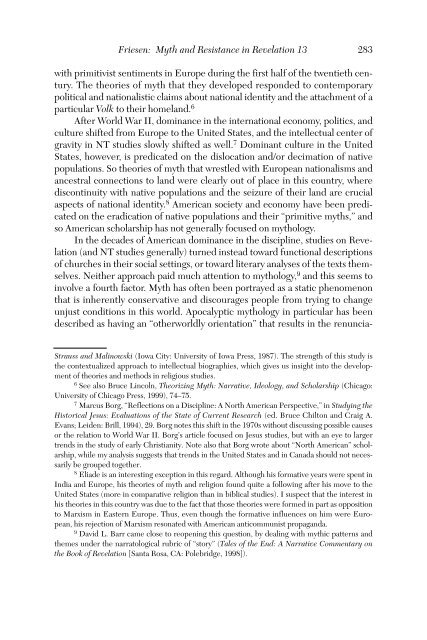Journal of Biblical Literature - Society of Biblical Literature
Journal of Biblical Literature - Society of Biblical Literature
Journal of Biblical Literature - Society of Biblical Literature
You also want an ePaper? Increase the reach of your titles
YUMPU automatically turns print PDFs into web optimized ePapers that Google loves.
Friesen: Myth and Resistance in Revelation 13 283<br />
with primitivist sentiments in Europe during the first half <strong>of</strong> the twentieth century.<br />
The theories <strong>of</strong> myth that they developed responded to contemporary<br />
political and nationalistic claims about national identity and the attachment <strong>of</strong> a<br />
particular Volk to their homeland. 6<br />
After World War II, dominance in the international economy, politics, and<br />
culture shifted from Europe to the United States, and the intellectual center <strong>of</strong><br />
gravity in NT studies slowly shifted as well. 7 Dominant culture in the United<br />
States, however, is predicated on the dislocation and/or decimation <strong>of</strong> native<br />
populations. So theories <strong>of</strong> myth that wrestled with European nationalisms and<br />
ancestral connections to land were clearly out <strong>of</strong> place in this country, where<br />
discontinuity with native populations and the seizure <strong>of</strong> their land are crucial<br />
aspects <strong>of</strong> national identity. 8 American society and economy have been predicated<br />
on the eradication <strong>of</strong> native populations and their “primitive myths,” and<br />
so American scholarship has not generally focused on mythology.<br />
In the decades <strong>of</strong> American dominance in the discipline, studies on Revelation<br />
(and NT studies generally) turned instead toward functional descriptions<br />
<strong>of</strong> churches in their social settings, or toward literary analyses <strong>of</strong> the texts themselves.<br />
Neither approach paid much attention to mythology, 9 and this seems to<br />
involve a fourth factor. Myth has <strong>of</strong>ten been portrayed as a static phenomenon<br />
that is inherently conservative and discourages people from trying to change<br />
unjust conditions in this world. Apocalyptic mythology in particular has been<br />
described as having an “otherworldly orientation” that results in the renuncia-<br />
Strauss and Malinowski (Iowa City: University <strong>of</strong> Iowa Press, 1987). The strength <strong>of</strong> this study is<br />
the contextualized approach to intellectual biographies, which gives us insight into the development<br />
<strong>of</strong> theories and methods in religious studies.<br />
6 See also Bruce Lincoln, Theorizing Myth: Narrative, Ideology, and Scholarship (Chicago:<br />
University <strong>of</strong> Chicago Press, 1999), 74–75.<br />
7 Marcus Borg, “Reflections on a Discipline: A North American Perspective,” in Studying the<br />
Historical Jesus: Evaluations <strong>of</strong> the State <strong>of</strong> Current Research (ed. Bruce Chilton and Craig A.<br />
Evans; Leiden: Brill, 1994), 29. Borg notes this shift in the 1970s without discussing possible causes<br />
or the relation to World War II. Borg’s article focused on Jesus studies, but with an eye to larger<br />
trends in the study <strong>of</strong> early Christianity. Note also that Borg wrote about “North American” scholarship,<br />
while my analysis suggests that trends in the United States and in Canada should not necessarily<br />
be grouped together.<br />
8 Eliade is an interesting exception in this regard. Although his formative years were spent in<br />
India and Europe, his theories <strong>of</strong> myth and religion found quite a following after his move to the<br />
United States (more in comparative religion than in biblical studies). I suspect that the interest in<br />
his theories in this country was due to the fact that those theories were formed in part as opposition<br />
to Marxism in Eastern Europe. Thus, even though the formative influences on him were European,<br />
his rejection <strong>of</strong> Marxism resonated with American anticommunist propaganda.<br />
9 David L. Barr came close to reopening this question, by dealing with mythic patterns and<br />
themes under the narratological rubric <strong>of</strong> “story” (Tales <strong>of</strong> the End: A Narrative Commentary on<br />
the Book <strong>of</strong> Revelation [Santa Rosa, CA: Polebridge, 1998]).

















